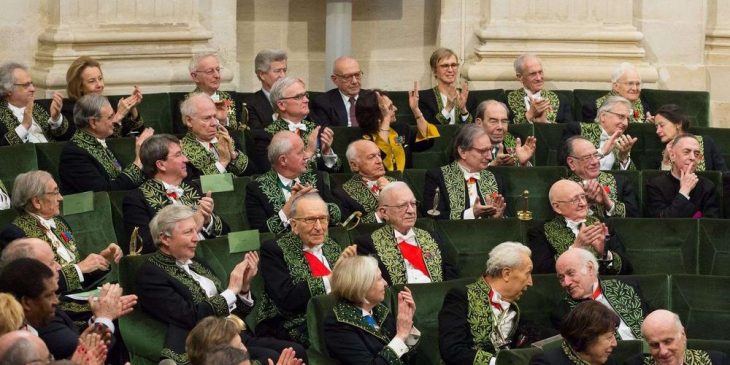
Word of the Day: Utmost
Today’s word of the day, courtesy of The Dictionary Project’s daily email, is utmost. Utmost can be an adjective or a noun, according to TDP. As an adjective, it means “of the most possible; greatest” or “located at the most distant or remote point or limit; farthest.” As a noun, it means “the most possible; the maximum” or “the greatest or best one can offer or provide.” As I have said before about such nouns, it seems really to be more of a substantive or substantive adjective to me, with the noun being modified left out. But the usage says that it is a noun in a sentence like, “The striker did his utmost to score a goal but failed.”
The word comes from “Old English utmest (Anglian) ‘outermost,’ double superlative of ut ‘out’ (see out (adv.)) + -most. Meaning “being of the greatest or highest degree” is from early 14c” (https://www.etymonline.com/word/utmost#etymonline_v_4582). We see here another example of broadening, where the adjective originally referred to a physical location but eventually meant something metaphorical.
“Anglian” refers to the language of the Angles. As we have discussed before, the Celts invited some German tribes to help them deal with the Scots and Picts. Those tribes were the Angles, the Saxons, and the Jutes. The Angles, supposedly name for their mythological founder, Angul. Angul’s brother, Dan, was the founder of the Danes. The Anglian language was a Germanic language, one of the precursors of Anglo-Saxon, and England is, of course, primarily named for the Angles. Both ut “out” and most go back to Proto-Germanic and ultimately to PIE.
According to the On This Day website, on this date in 1639 the Académie Française (/akademi fʁɑ̃sɛːz/ or French Academy) began work on the official dictionary of the French language, called the Dictionnaire de l’Académie française (Dictionary of the French Academy, which is an appropriate title).
The French Academy had its origin in a casual group of literati who met in salons in “Hôtel de Rambouillet during the late 1620s and early 1630s” (Wikipedia). Cardinal Richelieu, well known from The Three Musketeers, convinced King Louis XIII to make the group an official council. The purpose of academy is “to work, with all possible care and diligence, to give certain rules to our language and to make it pure, eloquent and capable of handling the arts and sciences” (https://blog.lingoda.com/en/french-academy/). According to Lingoda, the “academy is tasked with determining standards for the French language by:
- Creating new words and vocabulary, especially equivalents to English terms which seep into the French language (e.g. wifi).
Update old words and definitions.
Set and clarify grammar rules
Make decisions regarding the register of words (formal, informal, etc.).”
One might also say that the academy’s purpose is to keep the French language pure, uncontaminated by English.
The primary means for keeping the language pure is the dictionary. Three preliminary editions of the dictionary were published in 1687, and the first complete dictionary was published in 1694. It is this time of publication which makes me question the 1639 date for the beginning of the work on the dictionary because it would have been almost fifty years before the first preliminary dictionary was published. Four more editions were published in the 1700s, two more in the 1800s, and one in the 1930s. A ninth edition is being worked on but is not yet complete.
You might wonder about the English Academy, but in terms of a commission with letters patent to control the English language, there never has been one. Such institutions were proposed in the 17th and 18th centuries. Jonathan Swift published his “Proposal for Correcting, Improving and Ascertaining the English Tongue,” which advocated for such a governing commission, in 1712.
The idea never caught on, and I think that’s a good thing. One of the things the Académie Française has tried to do over the years is limit the number of English loanwords. Instead of borrowing words, the Academy prefers coining words from French roots. For instance, “The Académie Française has informed government officials to stop using English gaming terms like ‘e-sports’, it should be ‘jeu video de competition.’ Likewise ‘streamer’ should be ‘joueur-animateur en direct’” (https://en.wikipedia.org/wiki/Acad%C3%A9mie_Fran%C3%A7aise).
English, on the other hand, has been open to loanwords since its beginning around 500 AD. There are many words that have been borrowed from other languages that today most English speakers would think are native English. We borrowed moose from an Algonquian language. We borrowed pajamas from Hindi. We borrowed karate from Japanese. English speakers seem to borrow not only foreign words but also foreign clothes, foods, and activities. There is an openness to English speakers no matter what country they come from.
People often think about what life would be like if there were a universal language that all humans could speak. There have been times when a language in a particular time and place functioned as a bridge language or trade language or common language. Such a language is sometimes called a lingua franca: “Any language regularly used for communication between people who do not share a native language is a lingua franca” (https://en.wikipedia.org/wiki/Lingua_franca). Translated, lingua franca means Frankish language, and the Franks of course were the people who preceded the French. But the lingua franca of the modern world is not French, as it was throughout Europe in the Middle Ages, but rather English, the language that absorbs words from other languages freely.
Today’s image comes from Sud Ouest, the second largest daily newspaper in France. The photo (© Photo credit: Photo F. L/Wostok Press) shows some of the members of the Académie Française. The 40 members are chosen for life and are sometimes called immortals, though they clearly are not immortal. Is it any wonder that the group is demonstrates the utmost of conservative thought when it comes to the language?